
We may earn revenue from product links on this page and participate in affiliate programs. Learn More ›


We may earn revenue from product links on this page and participate in affiliate programs. Learn More ›
One of the most well-known small arms in the world is the Avtomat Kalashnikova, better known as the AK-47.
Much like the AR-15 there are many makes, models, and caliber options of the AK series, such as the PSA AK 101.
Palmetto State Armory(PSA) has been making AKs since 2015, and while it has hit some snags along the way, it has come a long way in the AK manufacturing.
I want to discuss the struggles that the AK line has gone through and where they are now because I think it’s important for a reviewer to not only look over the gun but also share all that they know about the firearm being reviewed.
The history of PSA AKs starts with the Gen 1 and PSA building AKs with build kits. They slowly but surely worked their way to building their own AKs in the Gen 1 and 2, but they finally started to work the kicks out in the Gen 3 series of AKs.
Gen 3 also gets a lot of hate from “AK purest,” who only acknowledge AKs as ones built by a small Eastern European child.
PSA started using forged components in the Gen 3 AKs, whereas the original AKs were made from cast metal.
I don’t want to delve too deeply into metallurgy, mostly because I’m not an expert in it; there’s no doubt that forged parts are stronger and more durable than cast.
Now, I don’t want to start a flame war in the comment section, but I want to address the notion that USA-made AKs aren’t any good.
That’s not true. First impressions are often hard to break, and when they are public and a reputation is built, well, it’s hard to change the perception quickly.
For example, the rumor was spread that Klasnovkov USA was using Russian TDP (Technical Data Package) for their American-made AKs, and thus, they were held in higher regard. Interestingly enough, the most recent bankruptcy filing revealed that KUSA’s Russian TDP was completely made up.
This isn’t surprising, as I always doubted Russia would happily turn over the TDP on how to make their most notable weapon in history.
Time to dive into this 5.56 AK and see if it lives up to the AK name or if the AK was really just designed for 7.62 and 5.45.
Going from tip to butt the muzzle
The muzzle device on the AK 101 is the classic AK-74 with the M24x1.5 RH face mount. Check your exact SKU of AK-101 because some have a standard 5.56 muzzle thread of 1/2×28.
I’m a big fan of suppressing guns but this is one that I might leave loud and pure.
If you plan to suppress, I recommend getting a JMAC Customs attachment with a hub-compatible suppressor.
I like to say I’m a trigger snob but I leave that to AR-15 and pistol triggers. AK triggers get a pass from me because of what the AK is really.
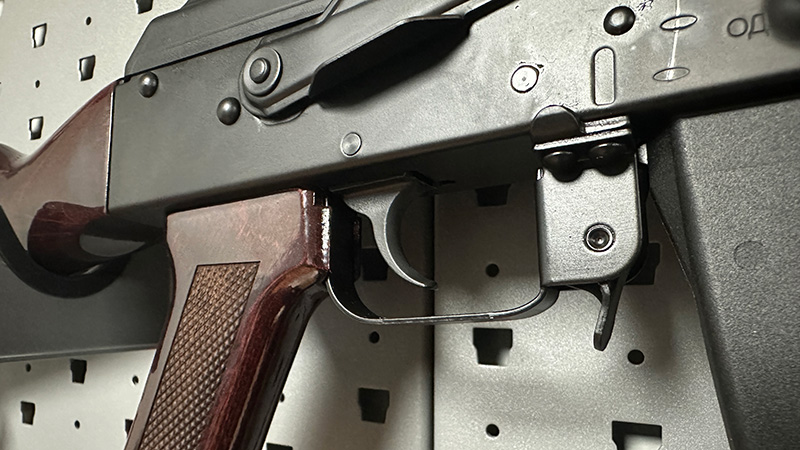
They generally aren’t finely tuned, highly inspec guns; on the contrary, it seems the more rudimentary the assembly is, the more people love them.
The grip and the handguard are both real wood but with a very nice heavy coating.
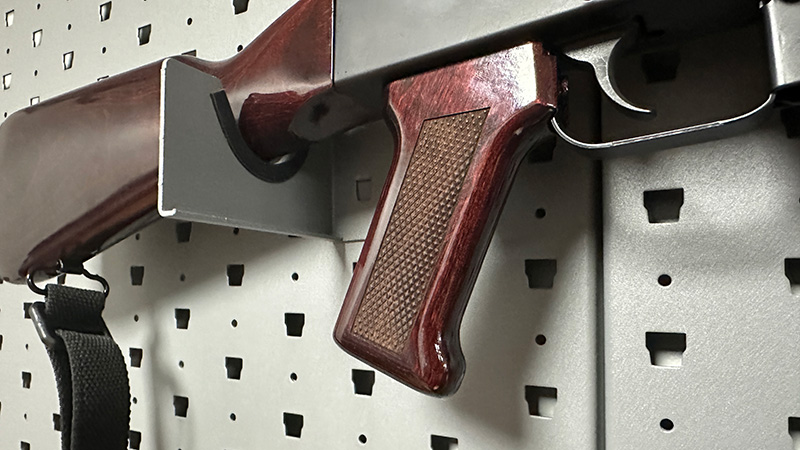
The coating feels almost plastic, but I have taken apart several of these guns, and the pistol grips are very much real wood.
While the grip isn’t my favorite (looking at you, US Palm), it gets the job done and is comfortable enough.
One of my only criticisms of the gun is that it only comes with one magazine. This is standard practice with rifles, so I won’t harp on it much.
But if you are going to buy one of these AK-101s, make sure to add a few more magazines to your cart, or you’ll spend more time loading than shooting.
The magazine itself works great and is a slick-sided Soviet Arms-branded magazine. I like that the 5.56 magazines have a slightly different look than the 7.62 magazines (aside from the slightly less aggressive magazine curl).
This makes it easy to identify 5.56 AK magazines vs 7.62×39 AK magazines.
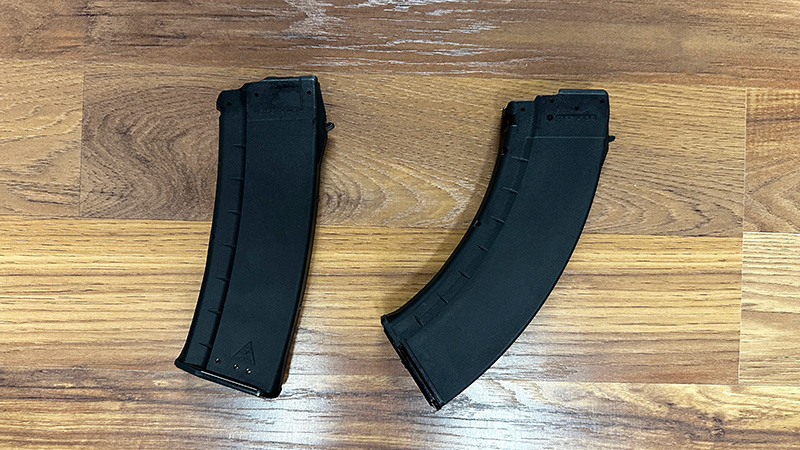
These hammer-forged bolts and charging handles will likely outlast your shooting needs.
The handle sticks out well enough to grab and rack the bolt.
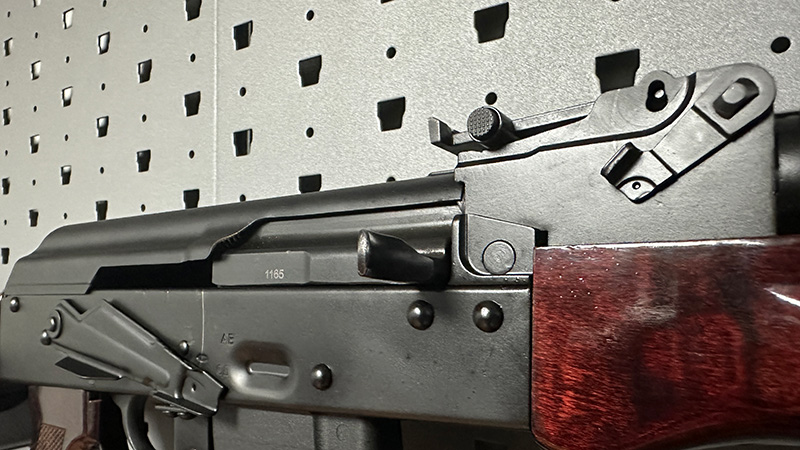
If you want to attach an option to the 101, you’ll need to opt for a model with a 1913 rail, or you can get an AK mount to mount your optic.
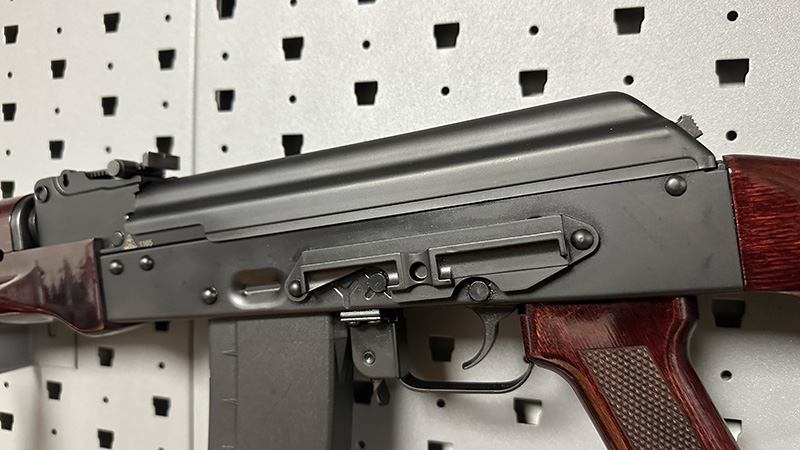
I love running a red dot on most AKs, but I will keep the 101 straight irons for now.
There’s just something about the plumb gloss that makes me want to keep it untouched.
Fit and feel on an AK can be tricky.
While the gun itself feels and functions differently than an AR-style rifle, you still want certain pieces of the AK platform to feel secure and solid.
The handguard is one component that should have a secure fit and feel.
The AK-101 has an extremely solid fit and finish.
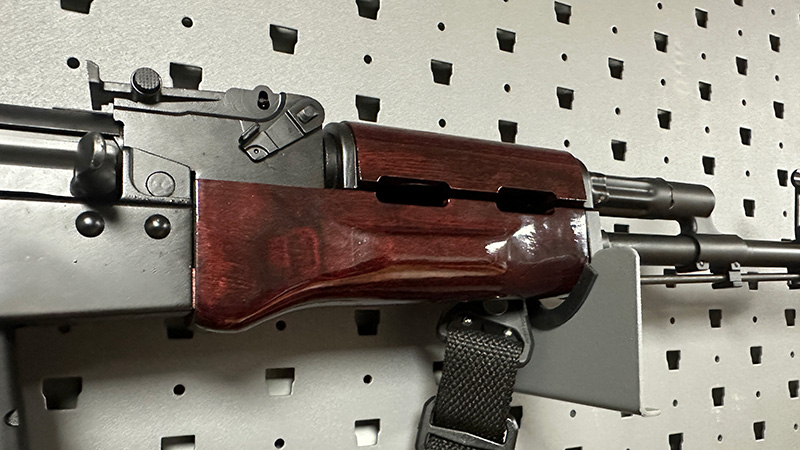
Another issue people have complained about from the early days of the PSA AK is the front-sight bus being canted.
There might be a once-in-a-blue-moon situation now.
I’ve not seen this issue in the 101 or any other PSA AKs I have reviewed.
The buttstock and grip are extremely tight and feel good while shooting.
Shooting this gun is interesting.
You might think that shooing a 5.56 vs 7.62×39 would be a lot different.
Not much.
There might be a slightly reduced perceived felt recoil on the 5.56 AK but not a significant amount.
With today’s AK prices, you’ll be hard-pressed to find prices like you could in the early 2000s and later 1990s, but even so, the PSA AK-101s are fairly priced.
Sitting right at or just under $1,000, they are a good buy for someone looking to avoid investing in a bunch of different ammo calibers.
It shoots and functions just like any 7.62 AK, and with the current price of 7.62×39 being the same as 5.56×45, you might as well stick to a caliber that you already have because of your AR.
Some may poo poo on PSA’s pew pew’s. From my experience their quality matches or exceeds some other manufacturers. A 5.56 AK just makes sense